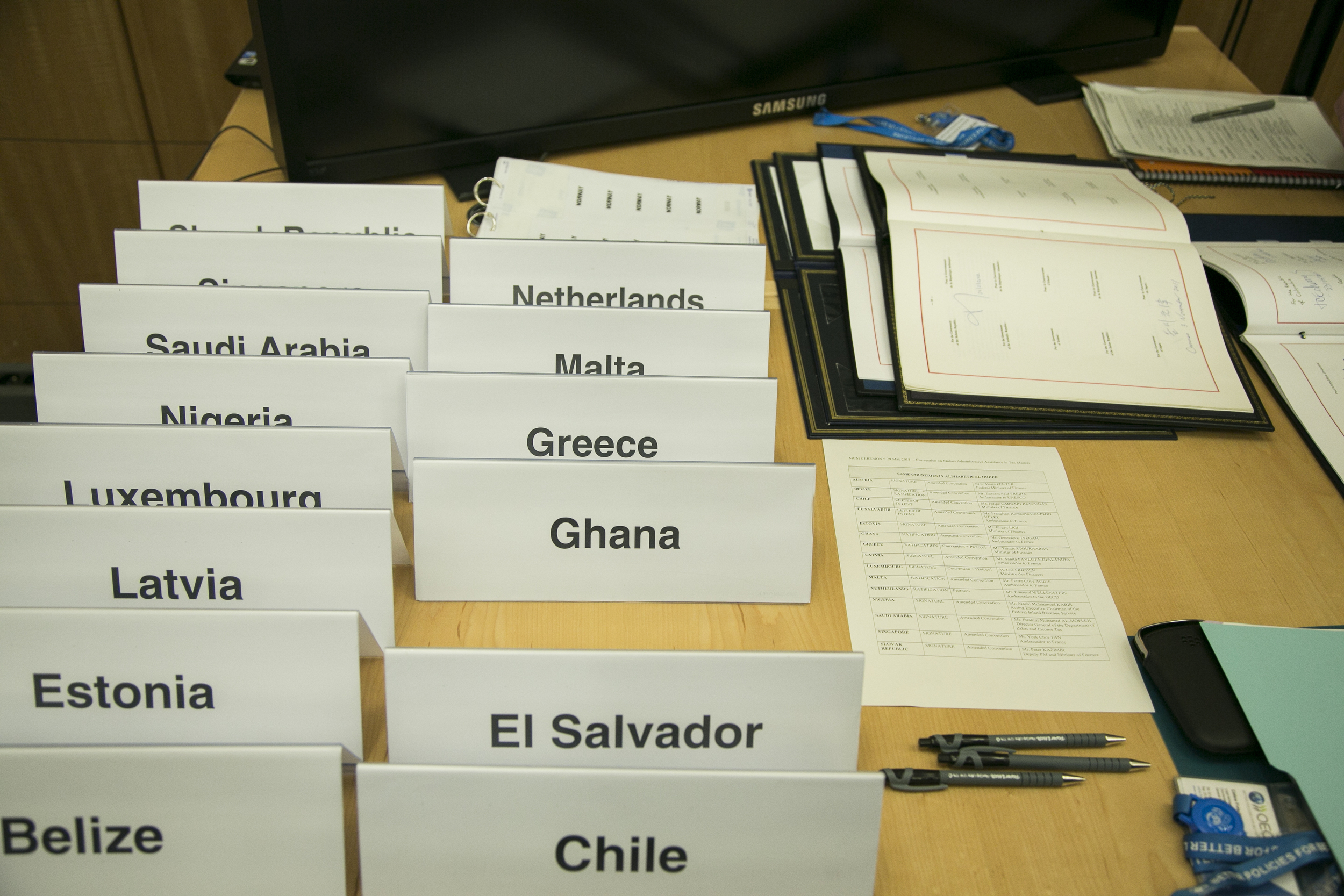Swiss tax allies falling by the wayside

The decision by Luxembourg and Austria to automatically exchange tax data with other European Union countries has isolated Switzerland in the global crusade against banking secrecy, a Tax Justice Network (TJN) expert tells swissinfo.ch.
The two European Union states caved in to demands last month by signing up to the revised EU savings tax directive (EUSTD) that closes many loopholes on the current withholding tax model.
Last year, Switzerland agreed to renegotiate its own withholding tax deal with the EU, signed a tax exchange deal with the United States (FATCA) and joined an Organisation for Economic Co-operation and Development (OECD) project to develop a global automatic tax data exchange model.
But German-based TJN campaigner Markus Meinzer believes that Switzerland is still fighting to preserve some aspects of banking secrecy.
swissinfo.ch: Luxembourg and Austria has agreed to the new EUSTD, including automatic exchange of information. How significant is this of this in the global fight against tax evasion?
Markus Meinzer: Their recent acceptance of the amended EUSTD marks a watershed moment in the European fight against offshore tax evasion. For more than 20 years, Luxembourg and Austria had spoiled efforts to curb banking secrecy across the EU.
For far too many years the offshore finance industries in these states were able to dictate the pace of progress in the fight against offshore tax evasion.
But caution is warranted. Will Luxembourg properly implement the new rules? It has a poor track record in this respect, along with various other countries.
While the OECD’s envisaged tax information exchange would be a multilateral agreement, countries that choose to cooperate would still have to sign bilateral treaties, according to the State Secretariat for Financial Matters (SIF).
SIF spokesman Mario Tuor said that Switzerland’s position does not differ in this respect from that of other OECD countries.
Tuor argues that Switzerland was not alone in being concerned at other countries potentially mis-using sent data.
The desire for tax data to be used only by another country’s tax authorities, and not to be passed on to other government departments, is of universal concern, he said.
Tuor says that there was not anything sinister about Switzerland wanting tax data exchange to be reciprocal under the planned OECD treaty.
This has been set out as standard procedure under OECD draft plans, according to Tuor.
swissinfo.ch: Where does this leave Switzerland?
M.M: Luxembourg and Austria were Switzerland’s natural allies, repeatedly derailing European efforts to open up data on tax evaders.
In their common battle to head off demands for automatic information exchange (AIE), they relied on the ‘level playing field’ argument. Luxembourg and Austria said: ‘We won’t open up if Switzerland won’t’, while Switzerland said: ‘Until Luxembourg, Singapore, Hong Kong and the rest of the world reform, we won’t’.
It was a game, a pretext and a recipe for a secretive status quo. But Luxembourg’s and Austria’s latest moves severely undermine the Swiss position.
swissinfo.ch: Switzerland has agreed to negotiate EUSTD but only if it includes talks for better access to EU markets for Swiss banks. Is this a dangerous road for the EU to go down?
M.M: This Swiss demand will probably not be heeded. For one thing, everyone in Europe knows from long and bitter experience that there are substantial risks in letting Swiss banks run amok in Europe.
The history, culture and business model of Swiss private banking has long rested on aiding tax evasion – and leopards do not easily change their spots.
European negotiators also know that global political pressures are building for Switzerland to give in on AIE anyway – whether or not it receives extra EU market access for its banks.

swissinfo.ch: Switzerland has signed FATCA and is taking part in OECD talks to establish a global AIE standard. Does this mean Switzerland has turned over a new leaf?
M.M: Unfortunately not. Switzerland has not committed to be among the early adopters group of the OECD’s Common Reporting Standard (CRS), nor is there even evidence that Switzerland really supports this work.
The fact that Switzerland had participated merely reflects its OECD membership, but does not tell us whether its officials are playing a constructive role or are indeed pushing delaying tactics.
I see indications that the latter is the case.
swissinfo.ch: What are these indicators?
M.M: Switzerland seems to be trying to create two sets of rules: opening up considerably to rich and powerful states while applying weaker standards for more vulnerable countries.
Insisting on bilateral, rather than multilateral, agreements allows Swiss negotiators to extract painful (often tax-related) concessions from developing countries.
Switzerland is also holding up progress by questioning whether developing countries can properly handle confidential data. This outdated, colonialist and paternalistic reflex ignores the fact that most developing countries already do this under other existing treaties.
Another tactic is insisting on simultaneous reciprocity with any country that seeks to receive information. This would be a tremendous waste of resources for many developing countries.
Last year, Switzerland took some important strides towards global tax compliancy.
In August, Switzerland agreed a deal with the US to allow Swiss banks to avoid criminal prosecution by coming clean about US tax cheats they already shelter.
A month later parliament accepted the US Foreign Account Tax Compliance Act (FATCA), which will compel banks to automatically provide data of future US clients.
In October, Switzerland signed an OECD convention that seeks to formulate a global blueprint for the automatic exchange of tax information.
In December, Switzerland agreed a mandate to negotiate with changes to the EU savings tax directive. Switzerland demanded parallel talks on giving Swiss banks better access to EU financial markets.
swissinfo.ch: Once EUSTD, FATCA and the OECD AIE standard are all up and running, does this spell the final death knell of banking secrecy?
M.M: The OECD’s CRS certainly has the potential to go a long way to end banking secrecy across the world. But much will depend on addressing some still open questions and ambiguities.
The reporting thresholds of $250,000 should be removed. And much hinges on whether the US will join and fully reciprocate.
And of course we will need to be alert to all the new shenanigans that bankers and lawyers will already be dreaming up.
CRS covers bankable financial assets but not alternative forms of wealth, such as assets kept in safety deposit boxes or art warehouses, and real estate, large ships and airplanes.
One day these types of assets ought to be equally subject to mutual information exchange.
swissinfo.ch: What of the billions of undeclared assets already parked in tax havens?
M.M: At the moment, only the US non-target deal with Swiss banks covers the exchange of data relating to past years.
It would be a good minimum AIE requirement to insist that data should be exchanged for the year prior to it coming into force.
This would undermine a lot of efforts to restructure portfolios outside the scope of AIE – such as converting assets into gold or cash in safety deposit boxes or splitting accounts into smaller parcels that each lie underneath the reporting thresholds.

In compliance with the JTI standards
More: SWI swissinfo.ch certified by the Journalism Trust Initiative



You can find an overview of ongoing debates with our journalists here. Please join us!
If you want to start a conversation about a topic raised in this article or want to report factual errors, email us at english@swissinfo.ch.